My Favorite Life-changing Peaceful Parenting Books with descriptions from author's websites
These books have drastically changed the way I parent and the way my son reacts to my parenting style. We have far fewer power struggles! We have more peace in our home. I am not afraid of the future because of the new frame of mind and problem solving skills these books have taught me.
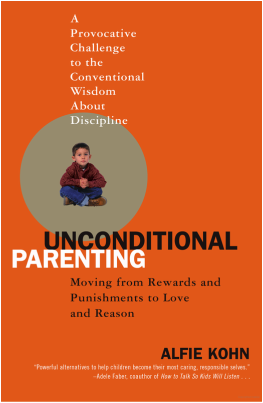
One basic need all children have, Alfie Kohn argues, is to be loved unconditionally, to know that they will be accepted even if they screw up or fall short. [don't we all have this need?]
Yet conventional approaches to parenting such as punishments (including "time-outs"), rewards (including positive reinforcement), and other forms of control teach children that they are loved only when they please us or impress us. Kohn cites a body of powerful, and largely unknown, research detailing the damage caused by leading children to believe they must earn our approval. That's precisely the message children derive from common discipline techniques, even though it's not the message most parents intend to send.
More than just another book about discipline, though, Unconditional Parenting addresses the ways parents think about, feel about, and act with their children. It invites them to question their most basic assumptions about raising kids while offering a wealth of practical strategies for shifting from "doing to" to "working with" parenting - including how to replace praise with the unconditional support that children need to grow into healthy, caring, responsible people. This is an eye-opening, paradigm-shattering book that will reconnect readers to their own best instincts and inspire them to become better parents.
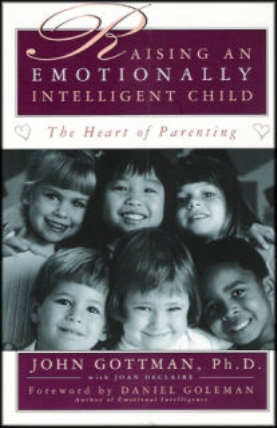
An outstanding resource for parents and caregivers! In this book, Dr. John Gottman explains how to coach children to regulate their emotional world to increase self-confidence, improve school performance, and contribute to greater physical health and healthier social relationships. Written for parents of children of all ages, Raising an Emotionally Intelligent Child will enrich the bonds between parent and child and contribute immeasurably to the development of a generation of emotionally healthy adults.
Dr. Gottman draws on his studies of more than 120 families to zero in on the parenting techniques that ensure a child's emotional health. He then translates his methods into an easy, five-step "emotion coaching" process to help parents:
- Be aware of a child's emotions
- Recognize emotional expression as an opportunity for intimacy and teaching
- Listen empathetically and validate a child's feelings
- Label emotions in words a child can understand
- Help a child discover appropriate ways to solve a problem or deal with an upsetting situation
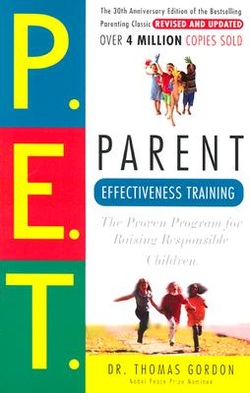
Parent Effectiveness Training (P.E.T.) began in 1962 as the first national parent-training program to teach parents how to communicate more effectively with kids and offer step-by-step advice for resolving family conflicts so everybody wins. This beloved classic is the most studied, highly praised, and proven parenting program in the world.
Customer Reviews from Amazon.com Amazing training for Parents
by F-jose Navarro Molina
"The best basic training program ever. Amazing. You will never make more excuses for not having a good educated and disciplined child. Never punish a son or daughter again. Its effectiveness is incredible."
P.E.T. -- a life-changing classic how-to
by John from Chester (Chester, NJ USA)"My wife & I took the P.E.T. course & read the book when our own children were young. Now we are giving the book to them (and re-reading it ourselves) for our grandchildren. The methods the book teaches are broadly applicable to dealing with people -- in the workplace and social situations as well as with children. These are not some gimmicks or tactics, but healthy and fulfilling ways of dealing with people. Actually DOING what the book says is not easy, especially with life-long habits in doing it another way. Having a spouse or others also trying is very helpful. But when it works, it is absolute magic! Buy this book and really give the approach a chance."
Read it before your baby arrives, then keep referring to it as your child grows
by Amber Castillo
Our son now is a bright, healthy, happy child who is independent, curious about the world around him and is rarely upset or taciturn. I believe it's all because we have found a way to cater to his needs that is fair for all of us in the household.
This is the beauty of PET. It is a not cookie-cutter, one-size-fit-all approach. The strategies are universal certainly but what it really teaches you is a way to communicate better with your child (even with each other) that is respectful of the differences in all of us.
I still read this book in order to keep refreshing the principles in my mind. I'm sure it will continue to be great resource well into my child's teens. I can't recommend this highly enough."
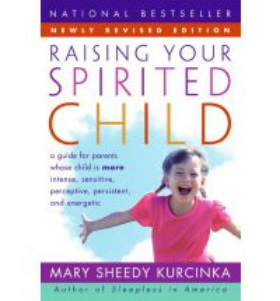
A guide for parents whose child is more intense, sensitive, perceptive, persistent and energetic
Raising Your Spirited Child offers ALL parents a glimpse into what makes their children act the way they do. Through vivid examples and a refreshingly positive viewpoint, it offers parents emotional support and proven strategies for handling the toughest times.
Raising Your Spirited Child can help you:
- plan for success with a simple, four-step program;
- discover the power of positive, rather than negative, labels;
- understand your child's and your own temperamental traits;
- cope with tantrums and blowups when they do occur;
- develop strategies for handling mealtimes, bedtimes, holidays, school, and many other situations.
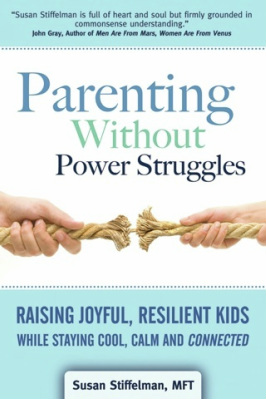
Imagine life without drama, meltdowns, and power struggles From celebrity parents to everyday moms and pops, single parents to grandparents, most of us know what to do when our kids behave. But let's face it: family life can get downright crazy, and it's at those moments that we most need to keep our cool.
Family therapist Susan Stiffelman has shown thousands of parents how to be the cool, confident "Captain of the ship" in their children's lives. Based on her successful practice and packed with real-life stories, Susan shares proven strategies and crystal clear insights to motivate kids to cooperate and connect.
Parenting without Power Struggles is an extraordinary guidebook for transforming your day-to-day parenting life.
You'll discover how to:
• Transform frustration and aggression into adaptation and cooperation
• Keep your cool when your kids push your buttons, talk back or refuse to "play nice"
• Nourish deep attachment with young and older kids
• Help your ADD'ish child survive and thrive, even if you’re ADD'ish yourself
• Inoculate your kids from negative thinking and peer pressure that lead to anger, anxiety, depression, or behavior issues
• Help children manage the emotional challenges of divorce
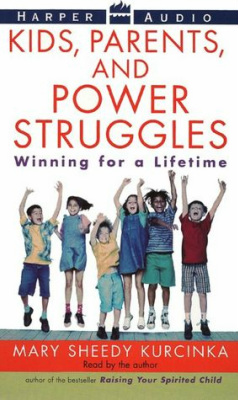
Winning for a Lifetime
On the surface, power struggles look like a tug of war. Parents and kids pitted against one another. Opposing forces pulling in different directions. Two individuals, at odds with one another, both determined to WIN!
The trouble is that if you win by simply over-powering your child, you still feel lousy. There's little pleasure in victory when your child is left feeling resentful and angry. If you lose, it can feel even worse. Every family experiences power struggles. But these daily tugs of war are not inevitable.
Kids, Parents, and Power Struggles helps you to unravel the mysteries of power struggles by offering insights into individual differences and normal patterns, recognizing that every child is unique and every discipline situation is different. Kurcinka views power struggles as an opportunity to teach your child essential life skills, such as how to calm oneself, to be assertive, to solve problems and to work cooperatively with you and others.
Included are successful strategies for: understanding emotions; managing intensity; identifying triggers.
Unlikely as it may seem in the heat of the battle, conflict really does present an opportunity to connect with your child — for a lifetime.

Is Your Child Misbehaving or Missing Sleep?
Does your child refuse to cooperate in the morning? Do you dread the constant bickering and fights between siblings, especially late in the afternoon? Does your child get into trouble for not listening or lacking focus? Is it a battle every time your child has to complete a task — any task? Is your child “losing it” over seemingly insignificant issues, like a bad hair day? Does your child seem to “resist” sleep? Are you tired? Really tired?
It is estimated that 60 percent of American children, from infants to teens, are wired and tired, too exhausted to behave well and unable to sleep. Could your child be one of them?
In this refreshingly warm and practical guide, Mary Sheedy Kurcinka shows you how to:
- recognize whether your child is misbehaving or missing sleep;
- identify the everyday decisions that may be innocently disrupting your child’s sleep ;
- end the bedtime and nighttime struggles and as a result stop the “misbehaviors” during the day;
- get the sleep your family needs and deserves.
- the scientific link between lack of sleep and children’s behavioral problems;
- the interplay between parent's sleep habits and children’s sleep and (mis)behavior;
- how never-before-recognized “normal” everyday events and issues leave children, even infants, too tense to sleep, even when they are put to bed;
- practical strategies and real-life examples to help children and their parents get the sleep they so desperately need;
- strategies for customizing the tools to “fit” each child and family.